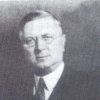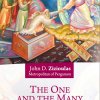After Čokorilo’s resignation, the editing of United Serbs was assumed by the controversial M. Ćuda. Very soon he too left and Palandačić took over the ailing newspaper. After the federation was dissolved in 1909, Palandačić had free reign to edit and finance it to the best of his abilities. Very soon he expanded the size of the original four-page newspaper and raised its circulation. Under his ownership and management, the newspaper continued publication for the next thirty years.
.After consolidating Ujedinjeno srpstvo, Palandačić began publishing an almanac called Serbian popular calendar United Serbs (Srpski narodni kalendar Ujedinjeno srpstvo). Such almanacs, called kalendari, were at that time very popular both in the Old Country and among Serbian immigrants. The name of this periodical genre comes from the fact that they contained the Orthodox calendar in addition to that numerous articles on Serbian political, historical and cultural topics as well as literary contributions (poems, stories, essays). Following the launching in 1907 of a new weekly called Balkan World (Balkanski svijet) and realizing the popularity of the kalendari, Palandacic began publishing an almanac titled King Peter the Great (Kralj Petar Veliki) in 1906. Balkan World continued publication after 1914 under a new name: Yugoslavia (Jugoslavija). King Peter the Great was later renamed America (Amerika), which was to become the foremost such publication in the U.S. with an unrivaled publication span of over fifty years. Palandačić edited 52 issues during his lifetime. The almanac’s publication continued for five additional years following the death of Palandačić in 1959.
Having dedicated his efforts to the publishing business, Palandačić opened a bookstore catering books from the Old Country. Later he complemented them with his own publications. The first book he published was Njegoš’s Mountain Wreath; he published collections of folksongs and folktales from the Serbian oral tradition (Marko Kraljevćc, Miloš Obilić, Boj na Kosovu, Crnogorske junačke pjesme and a collection of folktales compiled by Vuk Karadžić); popular novels such as Vidaković’s Kasija carica and Veselinović’s Hajduk Stanko; the first Serbian schoolbooks (Srpski bukvar and Srpska čitanka). The bookstore also catered records and music scores. His shop, first located in Van Buren Street, was later expanded and relocated on Dearborn.
Palandačić viewed Serbian publications as a specific part of the foreign language press in the multi-cultural city of Chicago. He was well acquainted with these publications and their editors. His active contribution to the Foreign Language Press Association of Chicago, involving around sixty foreign language publications, earned him the post of president. Among Serbian publishers, Palandačić was the leading and most successful professional, who clearly realized the significance of the foreign language press of his time:
Mr. Palandech recognized the need of the immigrant for orientation in the busy new world of his choice. Mr. Palandech saw the difficulties of the new American, and particularly of the Yugoslav who willfully transfers his roots from one civilization to another. He saw that the problems of transition from one culture to another are very great, and he meant to do something to help the immigrant find himself, as it were, in the machine civilization of America—in a world of industry and rapid transportation… He interpreted America to him, gave him an explanation for the sometimes puzzling happenings around him. And in doing so, he performed an outstanding service.
Palandačić also played an outstanding role in supporting Serbian Orthodox Church in America, cultural organizations in the Old Country and the war effort. In 1905 he became the first president of the Serbian Orthodox Church in Chicago and later contributed to the founding of the Monastery of St. Sava in Libertyville. He donated to the Serbian cultural society Prosvjeta in Sarajevo and established a fund for the education of students from Boka Kotorska. He was also responsible for organizing transferring the association of charities for Boka Kotorska and Herzegovina from Butte to Chicago. During World War I he supported the activities of the Serbian Red Cross, was the secretary of the Liberty Loan and a member of other organizations contributing to the war effort. His patriotic work is reflected in the conferences and rallies he organized in support of wartime Serbia. After the establishment of Yugoslavia, Palandačić supported the new state. He published the English language version of the new Yugoslav Constitution. After visiting his homeland in 1934, Palandačić published a series of articles on Yugoslavia in his own newspapers and the Chicago Daily News. Together with Mihailo Pupin, Palandačić played an important role in promoting Serbia and Yugoslavia in the American public opinion. For all those contributions Palandažić received high decorations both from King Aleksandar Karađorđević of Serbia (Order of St. Sava) and King Nikola of Montenegro. A book of outstanding citizens of Chicago (published in 1931) cites Palandačić as one of the five most honored citizens of Slavic background in the city.
This early period of the Serbian American press in Chicago witnessed the appearance of several more periodical publications, but these were fairly short-lived and far less influential in the Serbian American environment than Palandačić’s publications. One of them was a publication dedicated to church affairs. This was the Herald of the Serbian Church in America (Glasnik srpske crkve u Americi) established by Dabović. There were two socialist publications: The Workers’ Sentinel (Radnicka straža) established by the Yugoslav Socialist Federation and The People’s Voice (Narodni glas). Balkan was a political weekly. Gakovich and Radovich list two more publications, The Yugoslav Herald (Jugoslovenski glasnik) and Liberation (Oslobođenje).
Krinka Vidaković Petrov
Institute for Literature and Art, Belgrade
Serbian Studies
Volume 20, Number 1, 2006, pp. 30-56
E-ISSN: 1941-9511 Print ISSN: 0742-3330






